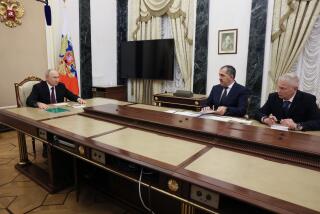Yeltsin Orders End to Parliament Guard Unit : Russia: He also follows through on his threat to ban a newly organized umbrella opposition group. Both moves are aimed at conservatives.
- Share via
MOSCOW — Russian President Boris N. Yeltsin on Wednesday ordered Parliament’s 5,000-member guard disbanded as an “illegal armed unit,” an action that pushed up his confrontation with his enemies yet another notch.
Yeltsin also made good on a threat by signing an executive order outlawing the National Salvation Front, a newly organized umbrella opposition group that has vowed to seek the firing of Acting Prime Minister Yegor T. Gaidar and his Cabinet.
Both acts reflected a toughening of the president’s resolve--and, his enemies contend, a display of Yeltsin’s true dictatorial nature--as pro- and anti-reform factions ready themselves for a session of the Russian Congress of People’s Deputies on Dec. 1.
The Russian legislature’s troops--dubbed the “Cardinal’s Guard” in an allusion to Cardinal Richelieu’s swordsmen in Alexandre Dumas’ swashbuckling novel “The Three Musketeers”--were sent Tuesday to the printing plant of the daily newspaper Izvestia.
That was a transparent attempt to remind the publication that the Russian legislature claims it as its rightful property. But it was evidently the last straw for Yeltsin, who has defended Izvestia’s independent, non-governmental status.
In a decree, Yeltsin said the parliamentary guards had no legal right to carry weapons or wear police uniforms since the force, created after the August, 1991, abortive hard-line attempt at taking over the Russian “White House,” or Parliament building, was never authorized by law.
The guards, whose functions swelled to guarding scores of facilities across Moscow, were not subordinated to the Russian president or the Interior Ministry, like normal police units. Instead, they answer to the legislature’s leadership, headed by conservative Chairman Ruslan I. Khasbulatov, who swings wildly between fulsome praise for Yeltsin and vicious attacks on his government.
Gunplay at a Moscow cafe last weekend led some Russian politicians who are suspicious of Khasbulatov’s motives for having his own independent armed force to demand some kind of action. One guardsman was killed and another wounded in a gun battle with Moscow police.
Interior Minister Viktor F. Yerin said that as a result of Yeltsin’s Wednesday order, some members of the “Cardinal’s Guard” will be transferred to his ministry while others who meet “necessary requirements” will continue to guard the Parliament building.
On Tuesday, Yeltsin said the world needed to realize that the National Salvation Front presented nothing less than a “great danger” to his program for giving Russia a market-driven economy and Western-style civil liberties; he asserted that the group was bent on overthrowing the legally elected government.
Russian news services said Yeltsin signed a decree dissolving the front’s leadership as a way of guaranteeing “democracy and the basic freedoms of the citizens of Russia” and doing away with a supposedly unconstitutional group.
By a stroke of the pen, Yeltsin outlawed all activities of the front and similar “extremist organizations” throughout Russia. State prosecutors and the Interior, Justice and Security ministries were ordered to take “the strictest measures” against any group seeking to “destabilize society” and sow “disorder.”
Despite the fearsome language of the decree, leaders of the front, many of whom enjoy immunity as members of the national Parliament, vowed to ignore it.
More to Read
Sign up for Essential California
The most important California stories and recommendations in your inbox every morning.
You may occasionally receive promotional content from the Los Angeles Times.













